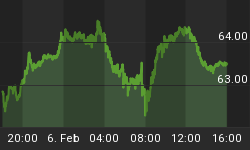On the op-ed page of the August 29th edition of The Wall Street Journal, Professor Ronald McKinnon suggests to the Chinese monetary authorities that they allow the yuan to appreciate relative to the dollar at an annual rate equal to the difference between the U.S. rate of consumer inflation and some target rate of Chinese consumer inflation. McKinnon found that when the Chinese monetary authorities began letting the yuan gradually appreciate against the dollar in July 2005, the inflation differential between the U.S. and China widened. That is in July 2006, the U.S. consumer inflation was 4.1% and the Chinese consumer inflation was 1.0%, for a differential of 3.1%. And on a year-over-year basis, the Chinese yuan appreciated vs. the dollar by 2.9% as of July 2006 (see Chart 1). Close enough for academic work.
Chart 1
My problem with the "McKinnon Rule" is that the Chinese consumer inflation data are suspect. My China expert and colleague, Jim Pressler, tells me that a lot of the component prices in the Chinese CPI are state controlled. Isn't it curious that all-items CPI inflation is on the rise in most economies except for the Chinese (see Chart 2)? Haven't the prices of oil and copper risen in China, too?
Chart 2
The Chinese currency is not the only one that has appreciated against the dollar. The euro has too. On a year-over-year basis the euro has appreciated by about 5% as of July compared with the Chinese yuan's 2.9% appreciation vs. the dollar. And was the differential between Euro-zone CPI inflation and U.S. CPI inflation approximately 5 percentage points as of July as McKinnon might have hypothesized? No. Using the harmonized CPI so that we are comparing apples to pommes, year-over-year Euro-zone inflation in July was 2.5% vs. U.S. inflation of 4.4%. So, the differential was only 190 basis points rather than the hypothesized 500 basis points.
Lastly, the Chinese monetary authorities are in the process of attempting to tighten policy despite the "fact" that Chinese inflation has trended lower to only 1%. Why? Perhaps they know that the Chinese CPI data are effectively bogus. They also know that by limiting the yuan appreciation to only 2.9% year-over-year has forced the creation of excess yuan liquidity which has inflated asset prices if the prices of goods are forbidden to rise by government regulation. It would appear that the Chinese monetary authorities are not enamored with the McKinnon Rule inasmuch as it is resulting in asset price bubbles in China.















